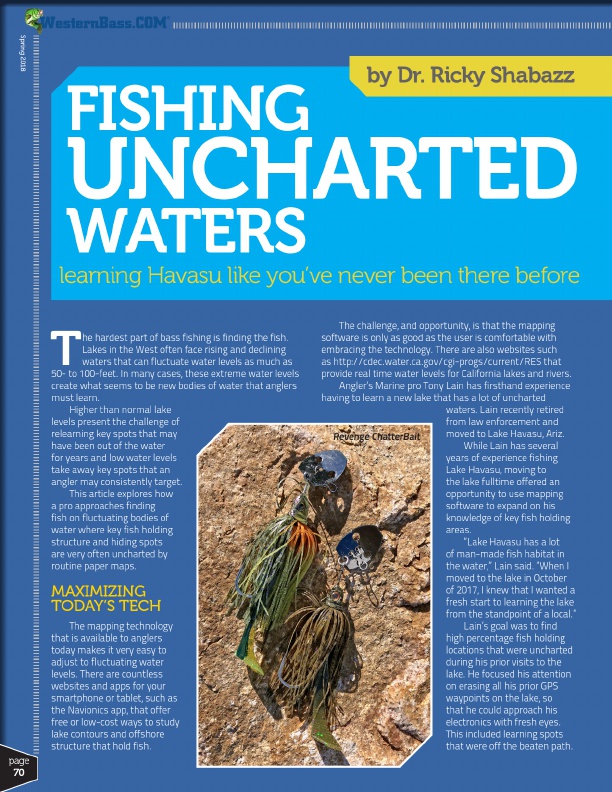
®
Spring 2018
by Dr. Ricky Shabazz
FISHING
UNCHARTED
WATERS
learning Havasu like you’ve never been there before
page
70
T
he hardest part of bass fishing is finding the fish.
Lakes in the West often face rising and declining
waters that can fluctuate water levels as much as 50- to 100-feet. In many cases, these extreme water levels
create what seems to be new bodies of water that anglers
must learn.
Higher than normal lake
levels present the challenge of
relearning key spots that may
have been out of the water
for years and low water levels
take away key spots that an
angler may consistently target.
This article explores how
a pro approaches finding
fish on fluctuating bodies of
water where key fish holding
structure and hiding spots
are very often uncharted by
routine paper maps.
MAXIMIZING TODAY’S TECH
The mapping technology that is available to anglers today makes it very easy to adjust to fluctuating water levels. There are countless websites and apps for your smartphone or tablet, such as the Navionics app, that offer free or low-cost ways to study lake contours and offshore structure that hold fish.
The challenge, and opportunity, is that the mapping
software is only as good as the user is comfortable with
embracing the technology. There are also websites such
as http://cdec.water.ca.gov/cgi-progs/current/RES that
provide real time water levels for California lakes and rivers.
Angler’s Marine pro Tony Lain has firsthand experience
having to learn a new lake that has a lot of uncharted
waters. Lain recently retired
from law enforcement and
Revenge ChatterBait
moved to Lake Havasu, Ariz.
While Lain has several
years of experience fishing
Lake Havasu, moving to
the lake fulltime offered an
opportunity to use mapping
software to expand on his
knowledge of key fish holding
areas.
“Lake Havasu has a lot
of man-made fish habitat in
the water,” Lain said. “When I
moved to the lake in October
of 2017, I knew that I wanted a
fresh start to learning the lake
from the standpoint of a local.”
Lain’s goal was to find
high percentage fish holding
locations that were uncharted
during his prior visits to the
lake. He focused his attention
on erasing all his prior GPS
waypoints on the lake, so
that he could approach his
electronics with fresh eyes.
This included learning spots
that were off the beaten path.